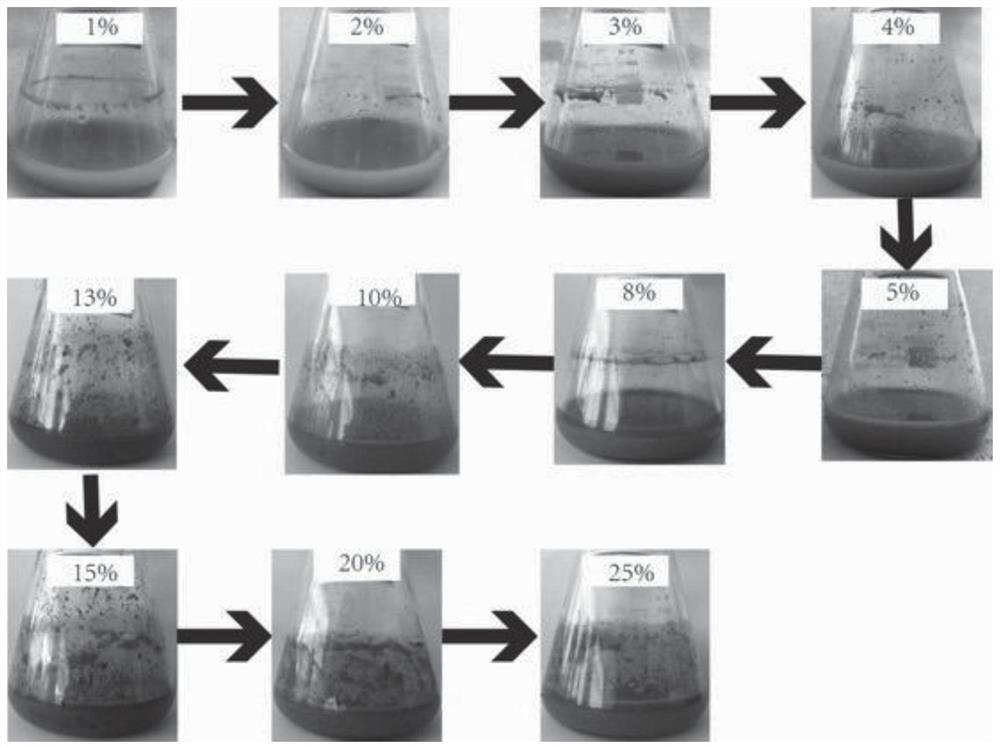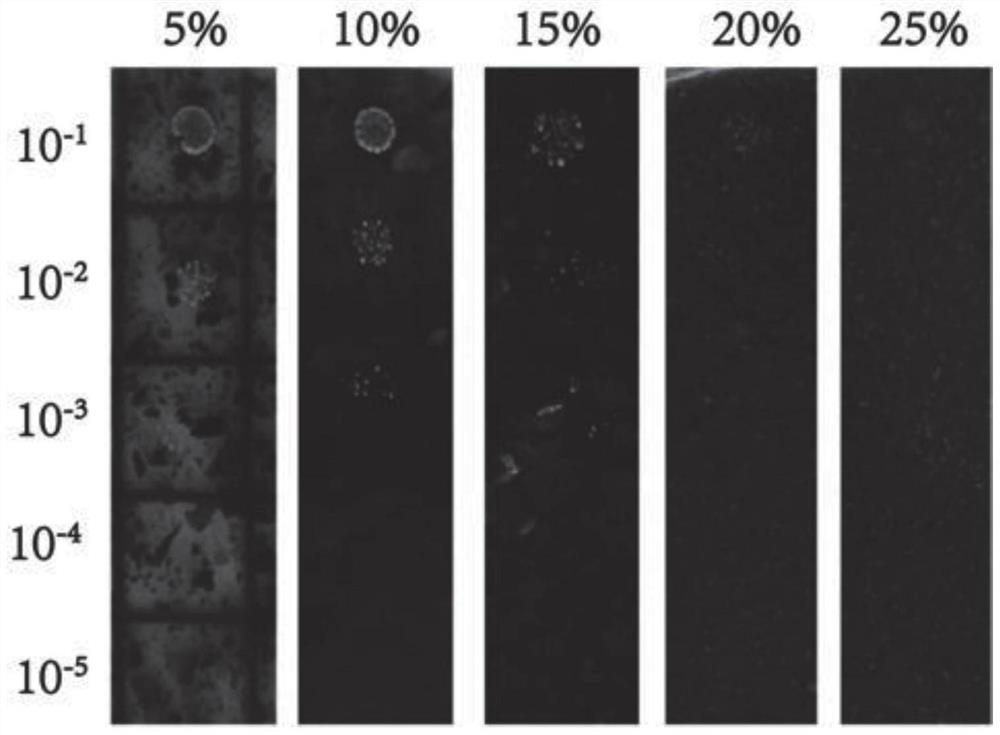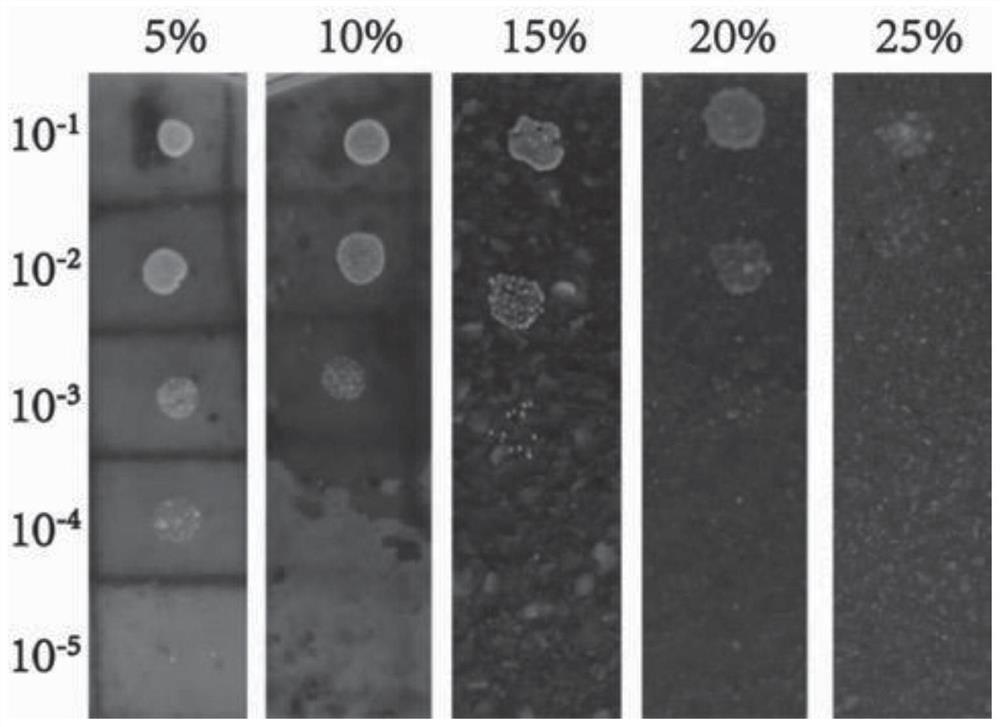Capsicum-tolerant ethanol high-yield yeast as well as screening method and verification method thereof
A verification method, yeast technology, applied in the field of waste resource recycling, can solve the problems of microbial growth and fermentation inhibition, reduce the utilization effect of food waste, complex food waste components, etc., and achieve high efficiency
- Summary
- Abstract
- Description
- Claims
- Application Information
AI Technical Summary
Problems solved by technology
Method used
Image
Examples
Embodiment 1
[0043] A screening method for ethanol high-yielding yeast tolerant to capsicum, comprising the following steps:
[0044] S1, screening out the high-yielding yeast strain of ethanol in sugarcane molasses, denoted as LSK1;
[0045] Specifically, in this example, 5 g of sugarcane molasses was added to YPD liquid medium containing 2% glucose, and after shaking overnight for 24 hours, 1 mL of culture solution was taken out and diluted with sterile water for 10 -6 10 -8 times, respectively spread on the YPD solid medium plate containing 2% glucose, and cultivate for 12 hours. After a single colony grows, pick it into the liquid medium and cultivate it for 12 hours. Take a small amount of bacterial liquid and observe the colony shape under a microscope to determine the yeast strain. Afterwards, the ability of each yeast strain to ferment and utilize glucose was measured, and the strain with stronger ethanol production ability was selected and named as LSK1 strain.
[0046] S2. Make...
Embodiment 2
[0054] A verification method for ethanol-producing yeast tolerant to capsicum, comprising the following steps:
[0055] S1, the ethanol high-yielding yeast strain in the sugarcane molasses is screened out, denoted as LSK1;
[0056] S2. Make the LSK1 strain undergo adaptive evolution of pepper tolerance, and obtain the adapted strain, which is denoted as LSK1pe;
[0057] S3. Construct an environment where capsaicin exists, and verify the ability of the LSK1pe strain to tolerate capsicum based on the homologous strain LSK1.
[0058] Wherein, S1 and S2 in this embodiment are the same as those in Embodiment 1, and will not be repeated here. Step S3 constructs the environment where capsaicin exists, and verifies the ability of the LSK1pe strain to tolerate capsicum based on the homologous strain LSK1, including comparing the growth status of LSK1 and LSK1pe under the capsicum environment, the ability to use glucose fermentation, and the ability to use starch fermentation to verify...
Embodiment 3
[0069] A high-yielding yeast tolerant to capsicum, the strain obtained by screening the screening method in Example 1 or verifying the verification method in Example 2 is based on the high-yielding strain selected from sugarcane molasses and obtained through the adaptive evolution of capsicum tolerance , at least it can be used for microbial fermentation of food waste containing capsaicin, or as a basic strain for constructing better strains.
PUM
 Login to View More
Login to View More Abstract
Description
Claims
Application Information
 Login to View More
Login to View More - R&D
- Intellectual Property
- Life Sciences
- Materials
- Tech Scout
- Unparalleled Data Quality
- Higher Quality Content
- 60% Fewer Hallucinations
Browse by: Latest US Patents, China's latest patents, Technical Efficacy Thesaurus, Application Domain, Technology Topic, Popular Technical Reports.
© 2025 PatSnap. All rights reserved.Legal|Privacy policy|Modern Slavery Act Transparency Statement|Sitemap|About US| Contact US: help@patsnap.com



